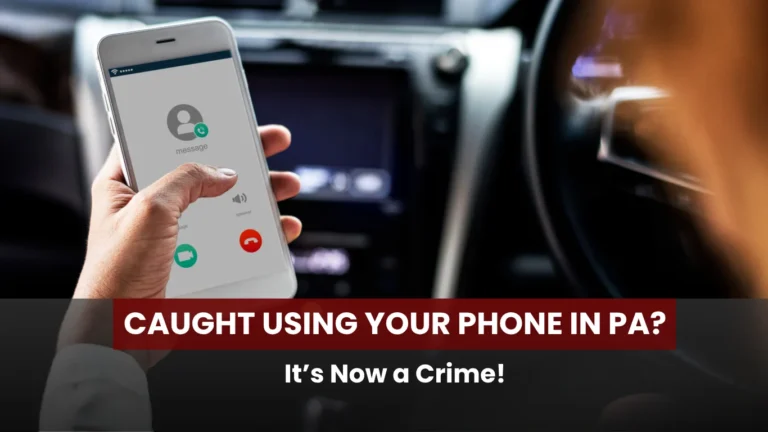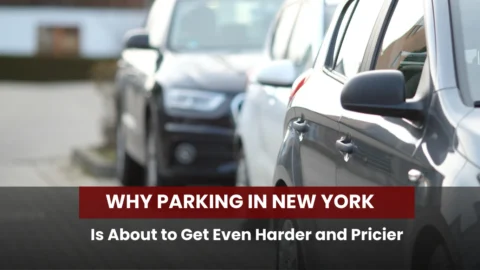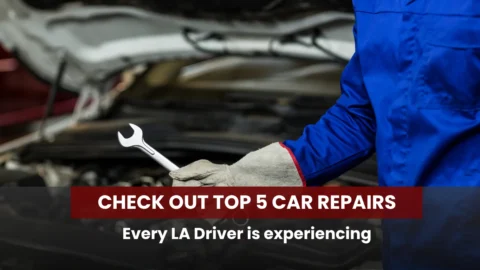Driving through Pennsylvania just got a lot more serious if your hands are on your phone instead of the wheel. The new mobile device driving law, also known as Paul Miller’s Law, has officially made it illegal to hold or use a handheld phone while driving. Whether it’s texting, scrolling social media, or checking directions, this legislation aims to reduce the increasing number of distracted driving incidents that have led to crashes and fatalities on Pennsylvania roads.
So, what does this mean for you as a Pennsylvania driver? Let’s break it down and look at what’s changing, why it matters, and how to avoid using a phone while driving and getting fined, which could easily ruin your day (and your record).
What Is Paul Miller’s Law?
The mobile device driving law signed by Governor Josh Shapiro is named in honor of Paul Miller, a young man from Reading who tragically lost his life in 2010 when a distracted driver hit him while using a phone. His family’s decade-long effort finally led to a new statewide standard banning the use of handheld devices while driving.
Under this law, drivers cannot hold or use a mobile device for any reason while the vehicle is in motion. That includes talking, texting, browsing, or even holding your phone for navigation.
Voice-activated systems, Bluetooth, or mounted dashboard devices are still permitted. This means hands-free is the only safe (and legal) way forward.
When Does the Law Take Effect?
The new mobile device driving law officially went into effect in June 2025, but the first 12 months serve as a grace period. During this time, law enforcement officers will issue warnings instead of tickets, allowing drivers to adapt to the change.
Starting June 2026, however, drivers will face real penalties for violations. So if you’re still casually texting at a red light, you’ll want to stop now before it becomes an expensive habit.
What Are the Penalties and Fines?
Once enforcement begins, being caught holding your phone behind the wheel will come with a phone while driving fine of $50 for the first offense. However, repeated violations could escalate fines and penalties depending on circumstances, especially if distracted driving leads to a crash.
More importantly, these fines will be recorded on your driving history, which could increase your insurance premiums. For professional drivers or those who rely on their license for work, this law carries even greater consequences.
So, while a fine for talking on your mobile while driving might seem small at first, the long-term costs in higher insurance rates or job risks could be much greater.
Why Pennsylvania Needed This Law
For years, Pennsylvania had only banned texting while driving. But that limited scope didn’t cover the broader problem of handheld use. Drivers could legally scroll through apps or hold their phones during calls, making enforcement nearly impossible.
Statistics revealed the danger:
- According to PennDOT, distracted driving contributed to nearly 11,000 crashes and 43 fatalities in 2023 alone.
- Studies show that taking your eyes off the road for just 5 seconds at 55 mph is like driving the length of a football field blindfolded.
With those numbers, the mobile device driving law isn’t just a rule—it’s a safety necessity. It aligns Pennsylvania with neighboring states like New York and New Jersey, which have already implemented similar handheld bans and reported reductions in accidents.
What Counts as Distracted Driving Under the New Law?
The law is clear: if your phone is in your hand, you’re breaking it.
Here’s what’s not allowed while driving:
- Texting or reading messages
- Scrolling social media
- Recording videos
- Browsing the internet
- Entering GPS destinations manually
- Holding your phone for calls
What is allowed:
- Using hands-free or voice-controlled systems (like Siri or Google Assistant)
- Adjusting a mounted GPS before you start driving
- Making emergency calls to 911
The goal isn’t to punish drivers—it’s to change habits that cause preventable crashes.
How the Law Will Be Enforced
Initially, Pennsylvania police will focus on education and awareness rather than punishment. Expect to see roadside signs, media campaigns, and community outreach explaining what the new mobile device driving law means for residents.
However, once the grace period ends, enforcement will tighten. Officers can pull you over if they see you holding a phone, and you may receive a citation even if no other violations occur.
Police departments across the state have emphasized that they’ll use discretion. But the message is clear: if your phone’s in your hand, you’re at risk of being fined for using a phone while driving.
What Are Lawmakers and Officials Saying?
Governor Josh Shapiro called the law a “common-sense step toward safer roads,” highlighting that distracted driving is now as dangerous as drunk driving.
Paul Miller’s family expressed gratitude after 15 years of advocacy, hoping it prevents other families from suffering similar losses.
State officials have also stressed that the law isn’t about generating revenue—it’s about saving lives. The focus is on prevention, awareness, and encouraging drivers to adopt hands-free habits before enforcement begins.
How This Impacts Everyday Drivers
For most Pennsylvanians, adapting to the mobile device driving law will mean making a few small but important changes:
- Mount your phone securely before driving.
- Set up Bluetooth or Apple CarPlay/Android Auto for calls and navigation.
- Use voice commands instead of tapping your screen.
- Avoid the temptation to “quickly check” messages at traffic lights. Yes, that still counts as driving.
You might think multitasking saves time, but one distracted moment can cost far more than any fine for talking on a mobile while driving. It could cost lives.
The Bigger Picture: Distracted Driving Culture
Paul Miller’s Law is part of a national movement toward stricter distracted driving regulations. Across the country, states are realizing that technology has outpaced old traffic codes.
Drivers today juggle smartphones, infotainment systems, and apps, all while trying to focus on the road. This law is a reminder that safety should always take priority over convenience.
Pennsylvania’s initiative could also inspire further advancements, such as:
- In-vehicle tech that locks mobile screens when driving is detected.
- Public campaigns promoting digital wellness and safer driving habits.
- Corporate fleet policies reinforcing compliance among delivery and transport workers.
What Happens If You’re in an Accident While Using a Phone?
Here’s where the new law carries real weight. If you’re involved in an accident and found to have been holding your phone, it can be used as evidence of negligence. That means potential civil liability, higher fines, and even criminal charges in severe cases.
In other words, it’s not just about paying a fine for using a phone while driving. You could face long-term legal and financial consequences.
Insurance companies also have the right to deny claims or increase premiums if distracted driving is proven to be the cause.
The Road Ahead for Pennsylvania Drivers
Change isn’t always easy, but it’s often necessary. With the mobile device driving law, Pennsylvania joins over 30 other states that have recognized the urgent need to tackle distracted driving.
This shift marks a cultural transformation in how we view mobile use behind the wheel. It’s not just a traffic violation anymore; it’s a crime that can endanger lives.
So the next time you reach for your phone on the road, remember: it’s not worth the risk, the fine, or the regret. Stay alert, stay safe, and let this law be a reminder that every call or text can wait until you’ve reached your destination.
FAQs on Pennsylvania’s Mobile Device Driving Law
The law bans holding or using handheld mobile devices for any purpose while driving, including talking, texting, or using apps. Only hands-free or voice-controlled systems are allowed.
The initial fine for talking on a mobile while driving is $50, but additional costs may apply, with court fees or insurance rate hikes.
No. Under the law, being “in control” of a moving vehicle includes temporary stops like traffic lights—so holding your phone is still prohibited.
Yes, but only if your device is mounted and hands-free. Enter your destination before driving to stay compliant.
The grace period ends in June 2026. From that point, violations of the mobile device driving law will result in official fines and citations.
Final Thoughts
Pennsylvania’s mobile device driving law isn’t just another rule—it’s a reminder that attention saves lives. As technology continues to evolve, so must our discipline on the road. Keep your hands on the wheel, your eyes forward, and your phone out of reach—because safety isn’t optional anymore.
Where curiosity meets horsepower—Ask About Cars.







